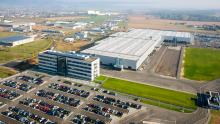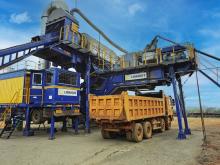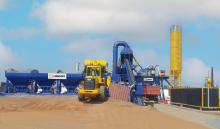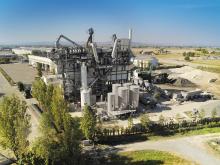
Aggregates Industries and Tarmac have both announced a move from traditional hot mix asphalt (HMA) to a lower carbon production method. Aggregate Industries says it has transitioned to warm mix asphalt (WMA) production as standard across its asphalt product portfolio. The UK-based building materials provider says that, as well as boasting a wealth of benefits from carbon savings, reduced build costs and enhanced life expectancy , warm mix asphalt offers the same high quality and performance when compared to its hot mix equivalent.
Mixing at temperatures 20°- 40°C lower, HMA allows for a significant reduction in CO2 emissions by using fewer fossil fuels and resources during the manufacturing process. In addition, Aggregate Industries says nuisance fuming, odour and steam at the project site are minimal, enabling enhanced and safer working conditions at both the plant and site.
WMA also reaches trafficking temperatures quicker than conventional hot asphalt, enabling earlier reopening of carriageways to the travelling public, resulting in less traffic disruption and potential to reduce build costs. This will increase a contractor’s productivity by enabling more material to be laid within a working window, reducing the overall construction timeframe and subsequent delays to motorists.
Lower asphalt production temperatures greatly reduce binder ageing and in combination with the highly compactable nature of the asphalt, pavement life expectancy is significantly enhanced.
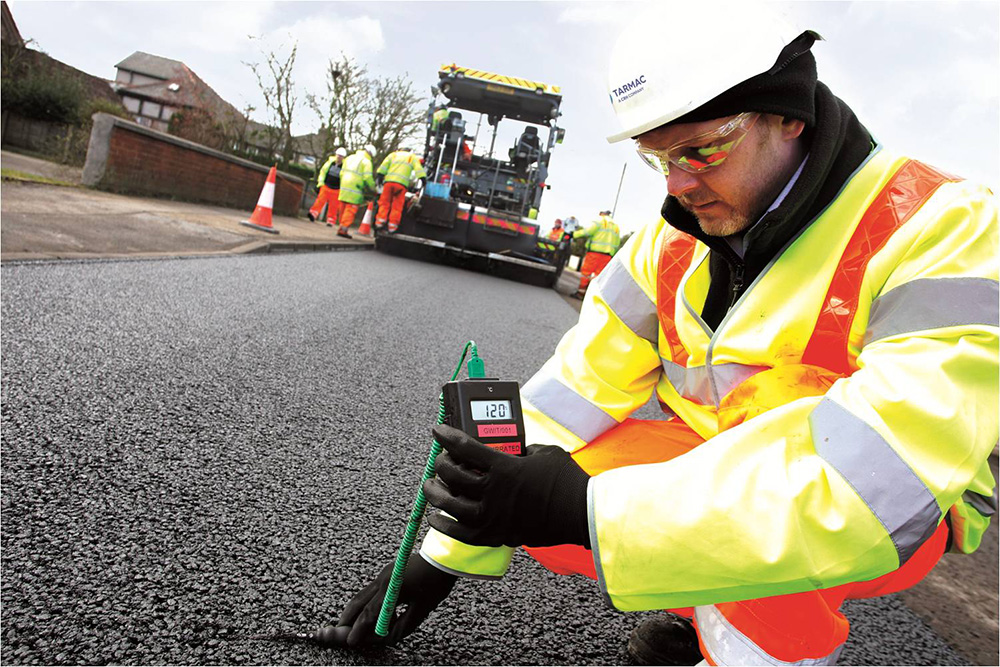
Surfacing contractor, Premier Road Surfacing, has already made the switch to Aggregate Industries' warm mix asphalt. Matt Pursglove of the company said: “Warm mix asphalt is a great product that has many benefits over the standard asphalt mixes. The benefit of using warm mix is that you can multi-layer within the same day if the site conditions allow, thus reducing the time required on site and lowering our carbon footprint. All our road planning produce goes back to Aggregate Industries’ mixing plants or quarries to be recycled back into the warm mix base and binder courses laid on our projects.”
Commenting on the transition to WMA, Vicky Smith, managing director of asphalt at Aggregate Industries, said: “This is an important next step on our carbon reduction journey, and a vital move for the sector. Road networks will continue to be an integral part of society and it is how we produce the raw materials and construct them that must change to incorporate pioneering and advanced technologies, without compromising on performance and quality. We must find ways for roads to last longer and perform better.”
Smith added that if all production in the UK switched to WMA, it would save around 61,000 tonnes of CO2 a year, the equivalent of cutting around 480 million kilometres (300 million miles) of car journeys. Up to £70m a year could also be saved through increased shift outputs.
Aggregate Industries says that lower temperatures for mixing also means that warm mix asphalt is easier to transport over long distances, saving time and money. When conventional asphalt is transported over long distances the logistical range is often restricted by asphalt temperature loss. Warm mix asphalt offers potentially longer haulage times to transport the product further without compromising workability.
Starting from July 1 this year, Tarmac has also started moving its default asphalt production to warm mix asphalt for all lower layer materials at 40 of its UK plants.
The company says the move to WMA production will help to save 13,500 tonnes of carbon dioxide a year – the equivalent of around 22,000 flights between London and New York.
Tarmac is calling on the UK highways sector to embrace warm mix materials to help decarbonise the nation’s roads. It says warm mix temperature asphalt technology can reduce the embodied carbon of asphalt by up to 15% compared to conventional hot mixes.
Brian Kent, technical director at Tarmac, commented: “While warm mix technology has been widely available to our customers over the past five years, against the backdrop of the climate emergency, we are now proactively switching our plants to offer this low-carbon material as our standard and preferred option.
“This is a significant sustainability-focussed improvement on Edgar Hooley’s original process, but it embraces the innovative spirit of our founder which remains at the heart of our business along with our clear commitment to help the UK transition to net zero.”
US-based asphalt equipment company Astec Industries is entering into an agreement to acquire MINDS Automation Group (MINDS), a leader in plant automation control systems and cloud-based data management in the asphalt industry.
Based in British Columbia, Canada, MINDS has locations in the US, UK, France and Belgium. The company develops user-friendly, advanced, customisable plant automation control systems for drum, batch, combo/hybrid hot mix plants, emulsion plants, liquid terminals, silo load-out, ticketing and data management for the asphalt industry.
“MINDS technology complements our existing offerings for asphalt production joining Astec Controls and Grathwol Automation as we build out a digital platform across our Rock to Road value chain of products ,” said Barry Ruffalo, president and CEO Astec Industries. “Our combined business will provide the knowledge and resources to further invest in industry-leading innovations that drive value for customers .”
Pierre Vidaillac, CEO of Minds will stay with Astec, along with the leadership team to support the advancement of its automation and controls technology and its overall ‘rock to road’ digital platform.
Vidaillac said: “We are excited to join Astec. We are a good fit with the company and its products and services. Astec built its business applying state-of-the-art technology to the industry.”
In central China, Henan Guanpu Construction Engineering has become a pioneer in asphalt recycling technology.
Three years ago, the company purchased an Ammann ABP 320 high-recycling technology (HRT) asphalt mixing plant.
The ABP 320 HRT was selected because of its low emissions, high efficiency, consistency, and ability to produce mix with high ratios of recycled asphalt (RAP).
The plant is supporting the construction of new roads and the renovation of old ones in Zhengzhou, the capital of Henan province. The long-term goal is to help Zhengzhou become the largest city in central China.
After starting production in 2020, the ABP 320 HRT quickly drew attention through its outstanding performance. In around a year it supplied 180,000 tonnes of high-quality asphalt mix for highway and municipal projects in Zhengzhou. The Henan Guanpu ownership group has praised the quality of the finished material and the high stability, reliability and environmental friendliness of the plant.
The plant is fully cladded, and designed to provide pleasing aesthetics in addition to top-quality asphalt.
The standard mix produced contains a high percentage of RAP. Roads created with a proper ratio of RAP meet all performance requirements while re-using old materials. RAP is increasingly being used in Beijing, Shanghai, Tianjin and other locations.
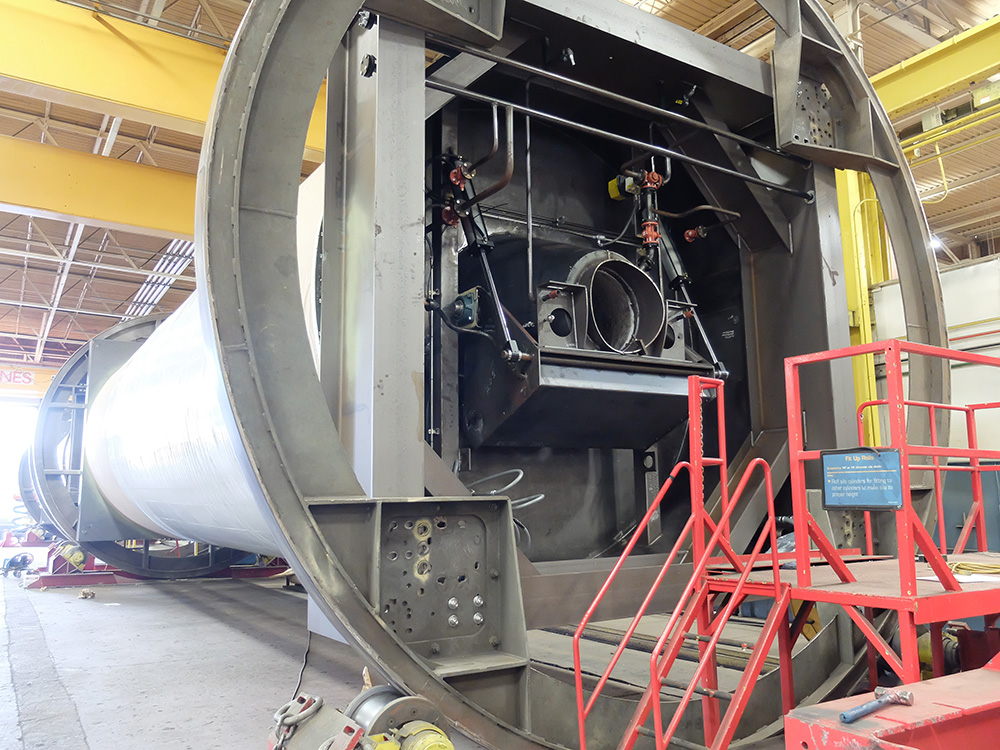
Zhengzhou resides in the middle of China. The Beijing-Hong Kong-Macau Expressway connects north and south, the Lianhuo Expressway connects east to west, and four national and nine provincial highways connect to the surrounding cities. The central city cluster has one of the denser expressway networks in all of China.
The city has attracted 41 Fortune 500 companies and seen a population boom, with more than 12.6 million residents in 2020.
Traffic on arterial and urban roads has become heavier as the population has climbed. As a result, many roads need to be built, overhauled or upgraded every year. A great deal of resources can be preserved if thousands of tonnes of asphalt are recycled – protecting the environment and reducing construction costs, too.
The parent company of Henan Guanpu is Zhengzhou Jinlu Municipal Engineering. The latter’s project portfolio includes Zhengzhou Shangcheng Road, Xili Road, Jingqi Road, Zheng San Street, Sauling Road and Rainwater Improvement Project, Xinhe Road and many more.
These projects have been praised by provincial and municipal leaders because of the excellent quality and fast completion.
Germany-based asphalt plant manufacturer Lintec & Linnhoff has started making units in India to serve the needs of the local market through its newly appointed licensed manufacturing partner, Gainwell Engineering.
Lintec & Linnhoff launched its locally-built TSD1500 MobileMix plant from the Linnhoff brand at the Excon India 2022 infrastructure equipment show at Bengaluru in May.
It also used the event to announce the launch of its new DRX DurableMix asphalt plant series. There will be two models in the new series: the DRX1500DS, with a maximum capacity output of 120 tons per hour; and the DRX2000DS, with a maximum capacity output of 160 tons per hour.
Both units offer productive operation with a batch cycle time of between 45 and 55 seconds and share a range of trademark features familiar to Linnhoff customers. Foremost of these is the double screen drum, which combines the drying and screening of aggregates in a single drum to deliver high levels of operating efficiency. The inclusion of the double screen drum eliminates the need for a hot elevator or vibrating screens, which Linnhoff says translates to lower operating costs and reduced maintenance requirements for its customers.
The locally-built TSD1500 MobileMix units are designed to appeal to Indian customers due to their high mobility , attributed to four fully integrated main mobile modules with built-in chassis.
The TSD1500 is designed to conform to international land transportation requirements. Lintec & Linnhoff says that, by offering important advantages in terms of enhanced mobility, the unit is ideal for use in remote locations or short-term projects.
All units are equipped with a hydraulic-power pack self-jacking system, which avoids the need for high-capacity cranes during installation and dismantling. As with the new DRX models, they also include double-screen drum technology for reduced fuel consumption and maintenance.
Despite being a relatively small sector, asphalt manufacturing solutions provider Benninghoven says the asphalt industry can make an important contribution to global decarbonisation efforts because asphalt production offers great potential for reducing emissions such as CO2 and Ctot (total carbon ).
One of the control instruments for owners of mixing plants is the taxation of emitted CO2 and emissions trading, the costs of which will increase worldwide in the years to come. The fewer greenhouse gases are emitted by asphalt mixing plants, the more costs can be saved.
Benninghoven says it supports plant owners with a variety of different solutions, and has decades of experience with recycling reclaimed asphalt. It adds that reusing the material is not only sustainable, but the material removed by milling the asphalt during road resurfacing is also significantly cheaper than virgin mineral from a quarry. In addition, reclaimed asphalt already contains bitumen which is also reused and therefore saves on the most expensive ingredient in asphalt production.
Benninghoven offers different cold and hot recycling feed systems for this, including its hot-gas generator recycling technology. It allows up to 100% recycling material to be added, with low emissions. The Benninghoven REVOC system is a patented innovation that will be presented at the bauma 2022 exhibition for the first time in October. The new retrofit solution is a supplement for existing asphalt mixing plants equipped with one or more recycling systems and it significantly reduces the total carbon concentrations in the exhaust gas.
Keeping the stored virgin mineral and recycling material as dry as possible is an important factor for an energy-efficient mixing process – and therefore for lower emissions such as CO2. Germany-based Benninghoven says that 1% more moisture in the starting material corresponds to a litre of additional heating oil or an energy equivalent for each ton of asphaltic mixture. This is one of the reasons why the German TA-Luft regulation now requires covered storage of these materials.
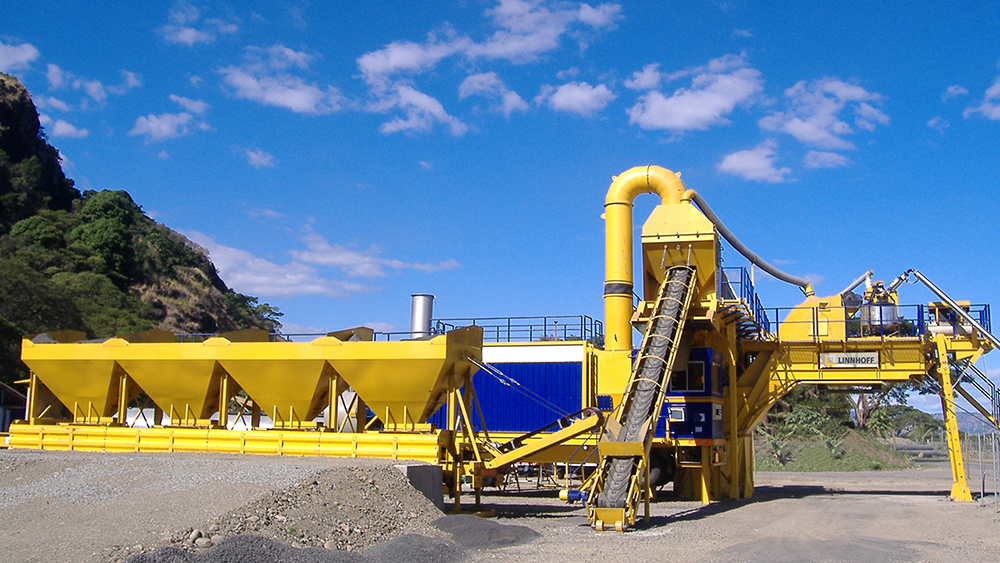
The drying and heating processes for virgin mineral and recycling material are particularly energy-intensive in asphalt production. Fuel and emissions can be saved if authorities and owners use reduced-temperature asphalt types. This refers to asphaltic mixtures with a final temperature of around 120 °C. This equates to a 30% reduction in contrast to conventional mixtures, which usually require a temperature of around 160 °C. The savings potential for energy and CO2 is even greater: 18,000 kWh and 6,000 kg of CO2 are saved during the production of 2,000 tonnes of asphalt every day.
More sustainability in asphalt production means moving away from fossil fuels such as coal and oil. Benninghoven offers the EVO JET burners which use fuels that are made from renewable raw materials and have a neutral CO2 balance. They include biomass-to-liquid fuels (BtL) and wood dust. Even the complex process of burning wood dust results in a smooth flame pattern – the prerequisite for reliable operation of the plant.
Benninghoven’s technology can also be used for modern fossil, gaseous fuels such as liquid gas or natural gas. Changing from coal dust to natural gas or liquid gas already halves CO2 emissions.
In addition to this, Benninghoven says its development engineers continue to work on the sustainable and economical use of other fuel types. It adds that using hydrogen, for example, could be an option for overcoming the challenges of the future.


